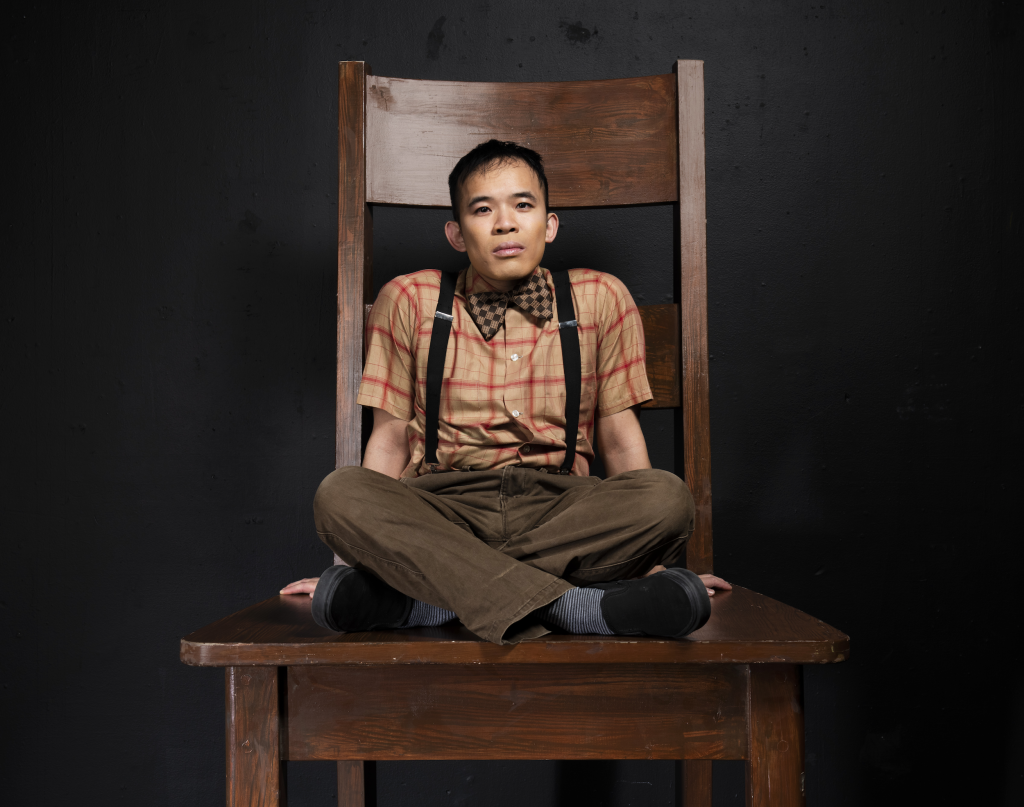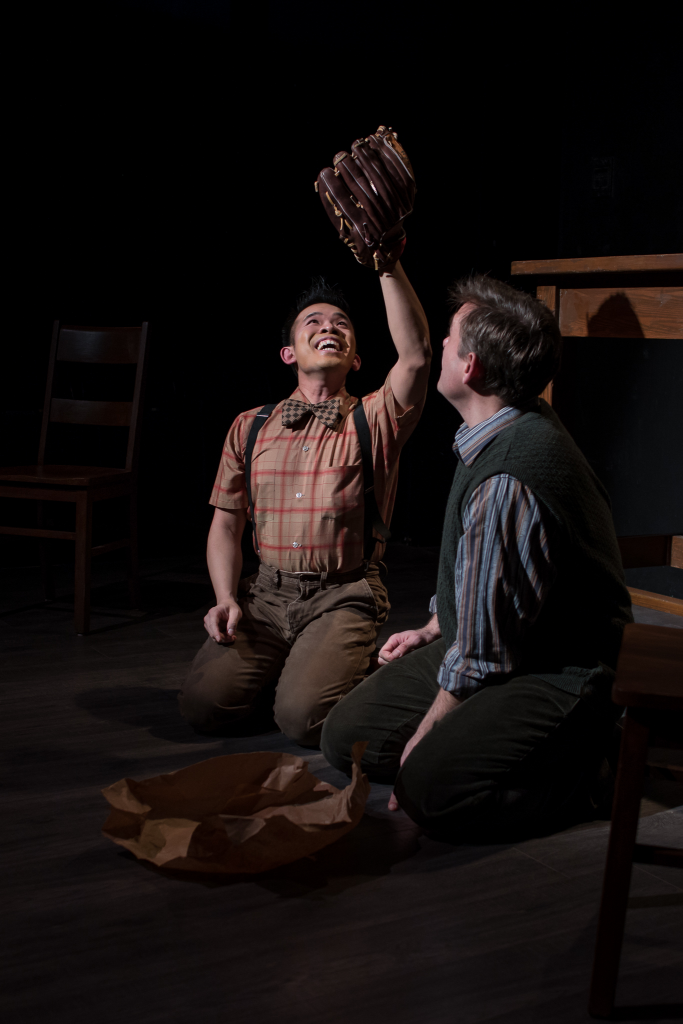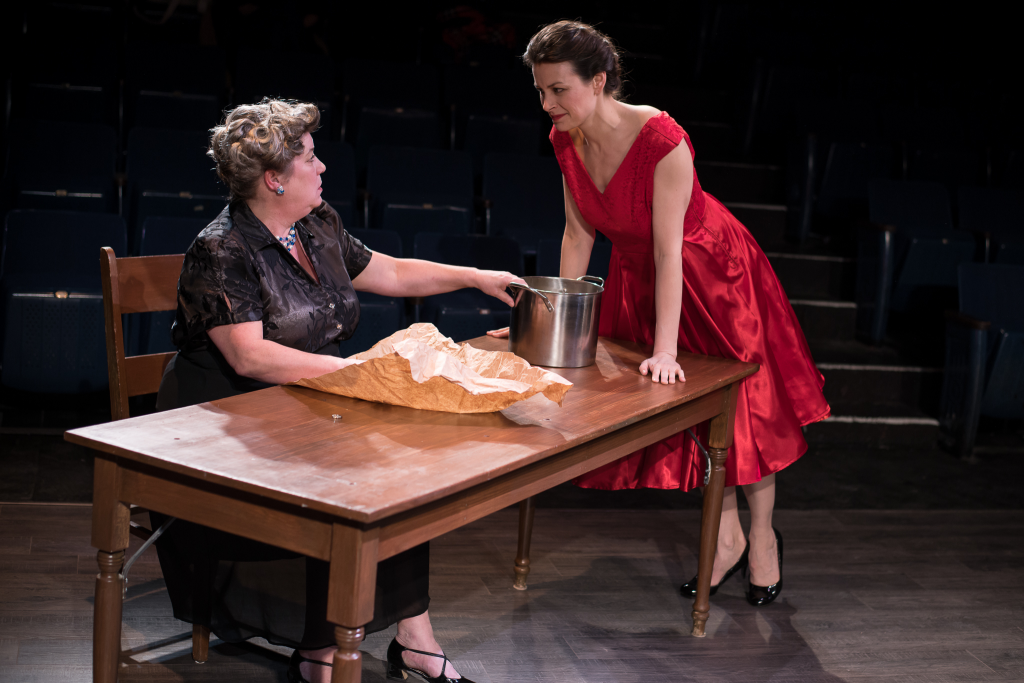
Credit: Emily Cooper
At Pacific Theatre until February 9, 2019
Tickets from $20 at 604-731-5518 or pacifictheatre.org
Posted January 24, 2019
Originally produced by Ensemble Theatre Company last summer at the Jericho Arts Centre, A Prayer for Owen Meany is being remounted as a guest production at Pacific Theatre where, because of the titular Owen Meany, who believes God speaks through him, and Pacific Theatre’s mandate to produce theatre that ‘rigorously explores the spiritual aspects of human experience’, it’s a good fit.
Based on the novel by John Irving, adapted by Simon Bent, A Prayer for Owen Meany is a memory play from the point of view of middle-aged John Wheelwright (Tariq Leslie). Twice we hear John say, “I am a Christian because of Owen Meany”. But why is John so fascinated with this tiny, undersized childhood friend who speaks with what various characters refer to as a “wrecked voice”? Why does Owen believe God speaks through him? And why does John eventually believe that, too? For me, the leap of faith is a chasm too wide to bridge. The sacrifice Owen makes later in life – as a young soldier – is undeniably an act of courage but not a fulfilment of the vision he had as a bed sheet-draped boy while playing the Ghost of Christmas Past in Dickens’ A Christmas Carol.
However, the play in its criticism of America during the Kennedy/Vietnam War years and the story itself, even though it frustrates credibility, is engaging. The production in the intimate space of Pacific Theatre is excellent.

Credit: Zemekiss Photography
Chris Lam portrays Owen and it’s not easy: references are constantly made to Owen’s miniscule stature and other-worldly voice; in the novel his dialogue appears all in upper case. Under Ian Farthing’s fine direction, Lam speaks in a falsetto voice, not overly loud, but weird. And as Owen goes through puberty, it does not deepen – as Owen knew it would not. Owen does, however, as a young man have sex, smoke dope, drink beer and string together obscenities not generally coming from the mouths of saints. He also volunteers to go to Vietnam. Lam is small but not unusually small; we first meet him sitting in an oversized wooden chair to make him appear tiny. When Owen goes toe-to-verbal-toe with various clergy, his parents, John’s relatives and a psychiatrist, Lam’s Owen is brash, outspoken, provocative, strong-willed and absolutely unshakeable in his conviction that he is the voice of God.
Tariq Leslie is the narrator John and credibly portrays John as a young lad, a teenager and, eventually, as a forty-five-year-old bachelor. Apart from Owen’s act of bravery, the script does not really give John a solid reason for his affection for – bordering on adulation of – Owen. John, born illegitimately, and who suffers when his mother is killed inadvertently by Owen, loses his faith but regains it after Owen’s death. Owen is John’s obsession.

Credit: Zemekiss Photography
Alexis Kellum-Creer is luminous as John’s mother Tabitha whom, the play suggests, is killed thereby proving, I guess, the wages of sin, as defined by her Episcopalian minister, are death. Tanja Dixon-Warren is John’s crotchety grandmother who eventually decides to pal around with Owen. Not sure what makes her change her mind about him.
It’s a huge cast of almost twenty and, as the play moves through time, the school children become adults as do John and Owen.
The design team – with costumes and music from the 30s and 40s – take us back in time and then bring us forward into the 50s, 60s and 70s.
Engaged as I was, I didn’t buy into A Prayer for Owen Meany. Apparently, according to Owen’s down-on-their-luck parents (played by Gabriel Carter and Kim Steger), Owen was a ‘virgin birth’. And there’s an image of poor Owen hung up by his friends in the cloakroom that evokes images of the Crucifixion. Are we really supposed to see Owen as the Second Coming? And is Owen’s sacrifice enough to banish all of John’s spiritual doubt and return him to the embrace of the Church? What are we really supposed to make of Owen?
A Prayer to Owen Meany is a quirky, mysterious piece of theatre excellently produced by the Ensemble Theatre Company. But for those of little faith – amongst whom I count myself – it remains enigmatic. Perhaps much was lost in the adaptation from the novel of over 600 pages to the stage.

